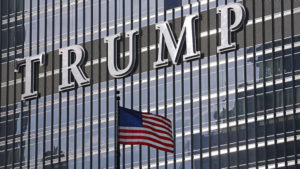by WorldTribune Staff, November 25, 2016
With Democrats and the elite media itching to pounce on the slightest hint of a conflict of interest between President-elect Donald Trump’s business empire and his presidential administration, author Peter Schweizer said Trump should consider “full divestment” of his holdings.
Giving his adult children the keys to run his businesses or putting his assets in a blind trust won’t be enough to avoid the appearance of a conflict of interest, said Schweizer, the author of “Clinton Cash”.

Schweizer, whose book revealed overlaps between Hillary Clinton’s State Department and her family’s personal and charitable finances, argued that unless Trump fully divests, he could be susceptible to conflicts similar to those that plagued the Clinton Foundation.
“It’s only a question of time” before the Trump Organization is approached by a foreign government or its allies with “sweetheart deals for the Trumps in hoping to curry favor,” Schweizer told CNN.
“And if they take those offers, it’s hugely problematic. It’s not only a conflict of interest, it’s the appearance of a conflict of interest. And then you’ve got major problems around U.S. foreign policy towards that country,” said Schweizer, pointing out that in many countries “those large real estate deals that they engage in are inherently political.”
Schweizer suggested Trump could avoid conflicts of interest if he were “to sell his ownership stake in the companies,” and also announced “that they are not going to have any government contracts. To divest yourself from real estate holdings is not an easy thing, but I think it would be a very powerful thing to do and would send a great signal to the American people who are clamoring for somebody to clean up Washington, D.C.”
Asked on Nov. 21 on Fox News about whether the president-elect’s team would “have to work out where the business starts and the presidency starts,” Trump campaign manager Kellyanne Conway said there are “experts behind the scenes doing that. The adult children, who already help him run his business and obviously will be the stewards of that business in their father’s absence, are on top of that.”
Trump spokesman Jason Miller told reporters that “we do have counsel that’s actively involved, and we’re comfortable with where everything is.”
The Wall Street Journal’s editorial page said last week that Trump’s “best option is to liquidate his stake in the company.” The editorial board questioned earlier plans for what some Trump lawyers called a “blind trust,” pointing out that “by law, blind trusts are overseen by an independent manager, not family members,” and noting that such arrangements are better suited for “liquid assets like bonds and stocks, not buildings or a branding empire. Mr. Trump will know how any given decision will affect, say, the old post office property in Washington, D.C. that he’s leasing from the federal government (another conflict).”
Numerous examples of potential Trump conflicts have already surfaced, according to Micah Morrison, chief investigative reporter for Judicial Watch.
- In China, a frequent Trump target on the campaign trail, the government-controlled Bank of China is part of a group that loaned a Trump affiliated office building in Manhattan $950 million.
- In India, Trump business partners are building luxury apartment complexes. Three Indian developers flew to New York last week and met with the president-elect.
- In Saudi Arabia, the Trump Organization is exploring hotel deals in the Red Sea port of Jeddah.
- In Germany, troubled Deutsche Bank has been involved in $3.5 billion in loans to Trump entities since 1998. Loans of more than $350 million from the bank are tied to Trump properties in Miami, Chicago and Washington.
“Trump could choose to fight. His lawyers could throw a legal blanket over the Trump Organization, declare his children valid managers of a blind trust, and take on all comers,” Morrison wrote. “But the drumbeat from the media and Democrats would be ceaseless, and legal challenges would follow, drawing the Trump administration into a morass.
“The alternative calls for considerable personal sacrifice from Trump. He could declare a transparency revolution, liquidate the Trump Organization, and release his tax returns. It’s smart policy and good politics too, giving the new president a commanding position on the moral high ground for a true anti-corruption crusade.”
